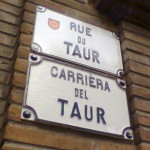
Parisians would probably argue that they speak French with no accent as opposed. The Parisian bourgeois intonation and terminology was successfully ridiculed by famed comedians Les Inconnus in the early 90’s.
The certified Parisian language that is usually spoken and understood by many in Paris is French. It has been the official dialect as per constitution since the year 1992. On the other hand, when considering Paris as a cosmopolitan city, English is the greatest common foreign language. It would be convenient for travellers to know a little of French language when roaming around the city for it is the prevailing Paris language. Especially since French is generally used in publications, advertisements, public education and legal documents.
Paris is undeniably one of the best tourist destinations of all time. In the busy streets of Paris, different foreign languages are spoken by the guides to entertain tourists in all races. Even in the major five-star hotels, business centers and main offices prepare multilingual staff to help interpreting for their guests.
Since French is the second widely spoken language in the world, people from all races assemble in Paris schools to study and absorb the language. The French language school founded in 1988 instructs high superior teaching of French as a foreign language. And it adopts the modernized teaching method in a sociable Parisian surrounding. This French language school is located at the downtown of Paris, just easily accessible to all parts of the world. There is also the L’Atelier 9 Language School, a renowned French language school at the center of Paris. The school offers intensive language courses in Spanish and in French as well, though there are also schools who teach English.
French as a dominant Paris language is refined and elegant as a lady. Truly the Parisian is proud of their language; it can be seen to the reflection of their culture and heritage.

To be honest, I find the French accent romantic yet funny all at the same time. No disrespect meant to the French people, I actually really love the French language and I actually don’t mind trying to learn it myself. What I find funny is the accent, the way the words seem to come out nasally. However, no one can deny that to hear someone speak French makes your heart melt. The French language is so unique and at the same time I also know how difficult it is to master. In fact, I believe it is more difficult to learn French than to learn English. With the English language, most of the words are pronounced the way they are spelled. How I wish it was this easy to pronounce French words. So even if the French language is a common subject for ridicule, French people should still lift their heads up because the French language is truly one of a kind.
Here are some translations from English to French together with its pronunciation. I totally agree with what you said Gelyn, the French words does not sound the same as it is spelled. These are the common words that are used by people in conversations.
Yes – Oui (wee)
No – Non (noh)
Okay – D’accord (dah-core)
Please – S’il vous plait (seel voo play)
Thank you – Merci (mair-see)
You’re welcome – De rien (duh ree-ehn)
Hello (during daylight) – Bonjour (bohn-jhoor)
Good Evening – Bonsoir (bhon-swarh)
Good Bye – Au revoir (o ruh-vwarh)
What’s your name? – Comment vous apellez-vous? (kuh-mahn tahl-ay-voo)
My name is – Je m’apelle (jhuh ma-pell)
How are you? – Comment allez-vous? (kuh-mhan tahl-ay-voo)
So-so – Comme ci, comme ca (kum-see, kum-sah)
I’m sorry – Pardon (pahr-dohn)
Do you speak English? – Parlez-vous anglais? (par-lay-voo zahn-glay?)
I don’t speak French – Je ne parle pas francais (jhuh ne parl pah frahn-say)
I don’t understand – Je ne comprends pas (jhuh ne kohm-prahn pas)
Where is…? – Ou est (ooh eh..?)
Why? – Pourquoi? (poor-kwah?)
straight ahead – tout droit (too drwah)
left – a gauche (a goash)
right – a droite (a drwaht)
here – ici (ee-see)
there – la (lah)